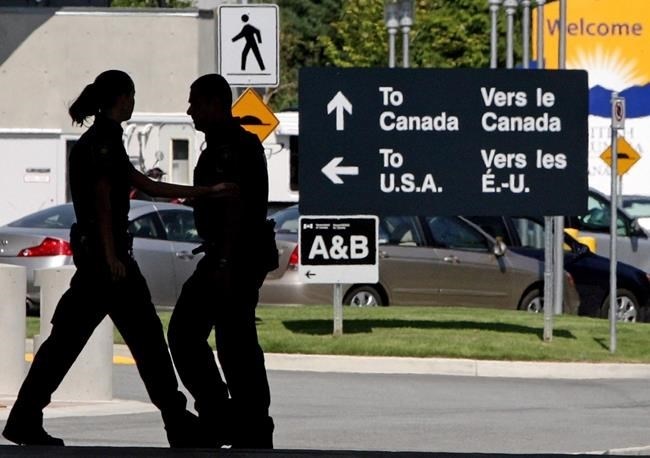
Canadian border guards are silhouetted as they replace each other at an inspection booth at the Douglas border crossing on the Canada-USA border in Surrey, B.C., on Thursday August 20, 2009. A new study commissioned by the Retail Council of Canada says an increase in the duty-free allowance for cross-border shopping would lead to hundreds of thousands of job losses and cut billions of dollars from the Canadian economy.
Image Credit: THE CANADIAN PRESS/Darryl Dyck
January 20, 2018 - 6:00 AM
CALGARY - Canada's retail industry is warning that raising the duty-free allowance for cross-border shipments could lead to hundreds of thousands of job losses and cut billions of dollars from the Canadian economy.
The numbers come from a Retail Council of Canada-commissioned PwC study out Friday that shows the potential fallout if Canada agreed to requests from U.S. lawmakers to increase the duty-free allowance from $20 to $800 as part of NAFTA talks.
"It has very, very significant implications for not only our sales, but for employment in the industry, for Canadian GDP, and actually for revenues for government," said Karl Littler, vice-president of strategic issues at the Retail Council.
The study found the net economic impact of raising to $800 the allowance for charging taxes and duties on international shipments, a value known as the de minimis threshold, would lead to a $12-billion hit to Canada's GDP by 2020 and upwards of 300,000 job losses.
PwC said the economic impact from lost retail sales from an increase would actually be about $24.3 billion, but it would be tempered by an $18.7 billion increase in disposable income for consumers because of the lower cost of U.S. goods.
The study notes that job losses in the retail industry would affect lower-income employees, while the benefits to cheaper goods from the U.S. would go to those who consume the most.
Littler said raising the threshold would unfairly benefit major U.S. online retailers like eBay and Amazon, which have been pressuring the Canadian government for years on the issue, because they are able to avoid many of the taxes and costs faced by Canadian retailers.
"To raise the minimis completely skews the system towards U.S. warehouse sellers."
PwC projects that the fallout would also include an estimated $10.9 billion loss of government revenue, a sharp contrast to a 2016 study by the C.D. Howe Institute that found a rise in the allowance would have a neutral impact from government revenue.
The numbers from the PwC study, however, look to paint a darker picture than is likely to happen, said Daniel Schwanen, vice-president of research at the C.D. Howe Institute.
"It basically assumes Canadian retailers, when faced with more competition, will lay off people and essentially not to anything to try and recapture those sales," said Schwanen.
He said that while the study accounts for significant cost savings for consumers, it might underplay how much Canadian retailers could benefit.
"If consumers save, they're going to spend more, and what they spend more is not all going to be on imports. They're going to go to the local stores to spend more if prices come down as they would."
Littler said Canadian retailers already have smaller margins than their U.S. counterparts so have less room to adapt, but that he's encouraged the Canadian government has pushed back on the proposal.
"We feel we're on pretty strong ground because our government has been supportive and understands the implications not only for us but for Canadians and the Canadian economy in general."
The study also looked at the implications of a smaller increase in the allowance, finding that raising only the duties and not the tax threshold to $200 would mean an estimated $6 billion cut to the GDP and 124,000 in job losses and a $1.2 billion cut to potential government revenue.
News from © iNFOnews, 2018